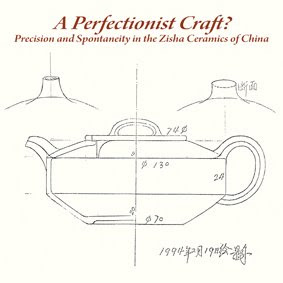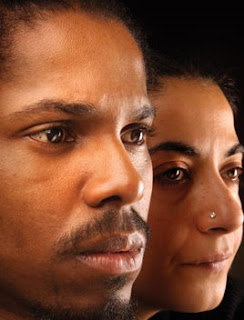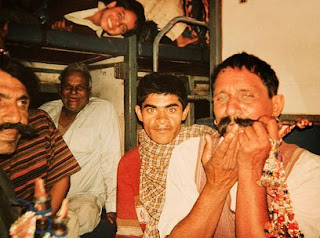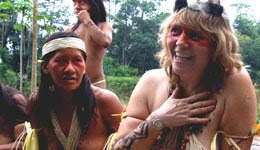 After waking up with a strong cuppa' today, I'll be starting off with a visit to the Museum of Archaeology and Anthropology (MAA) in Cambridge to have a look at their collection of Zisha teapots from China. The pots are apparently the finest vessels in all the world for preparing tea, and remain a luxury item in their homeland. This exhibition looks at the notions of 'authenticity' that lie behind them, for whilst the teapots are presented as spontaneous artistic creations by their makers, they are in fact the result of many years of training and careful craft. Tea, as such an important commodity, has been the subject of several anthropologists' studies, such as Alan Macfarlane's 'Green Gold', and Chatterjee's 'A time for Tea'. It was also the subject of Goldsmiths student ethnographic film - which you can watch online. The MAA is open from Tuesday to Saturday between 10.30 and 16.30 and entrance is FREE.
After waking up with a strong cuppa' today, I'll be starting off with a visit to the Museum of Archaeology and Anthropology (MAA) in Cambridge to have a look at their collection of Zisha teapots from China. The pots are apparently the finest vessels in all the world for preparing tea, and remain a luxury item in their homeland. This exhibition looks at the notions of 'authenticity' that lie behind them, for whilst the teapots are presented as spontaneous artistic creations by their makers, they are in fact the result of many years of training and careful craft. Tea, as such an important commodity, has been the subject of several anthropologists' studies, such as Alan Macfarlane's 'Green Gold', and Chatterjee's 'A time for Tea'. It was also the subject of Goldsmiths student ethnographic film - which you can watch online. The MAA is open from Tuesday to Saturday between 10.30 and 16.30 and entrance is FREE.FRIDAY JULY 4th - Lifting horizons
SATURDAY JULY 5TH - Removing rights
 On Saturday I'm attending a new play down by London Bridge (which is then going on national tour to Manchester and Liverpool) about the asylum and refugee situation in the UK at the moment. Interestingly, it is an interactive experience, as the audience wander between sections of the 'removal centre' stage. Featuring original testimony from asylum seekers' experiences, including one which you can view online here, the production is being put on by The Red Room - an arts organisation which aims to questions the status quo. This interrogation of stereotypes and perception is crucial in anthropology, so the play should be well-worth getting along to. It runs at the Southwark Playhouse until 12th July at 19.30 and tickets are cheaper the earlier you book!
On Saturday I'm attending a new play down by London Bridge (which is then going on national tour to Manchester and Liverpool) about the asylum and refugee situation in the UK at the moment. Interestingly, it is an interactive experience, as the audience wander between sections of the 'removal centre' stage. Featuring original testimony from asylum seekers' experiences, including one which you can view online here, the production is being put on by The Red Room - an arts organisation which aims to questions the status quo. This interrogation of stereotypes and perception is crucial in anthropology, so the play should be well-worth getting along to. It runs at the Southwark Playhouse until 12th July at 19.30 and tickets are cheaper the earlier you book!SUNDAY JULY 6TH - Tibet on screen
 This fine Sunday I'm planning to learn more about Tibetan society. Firstly, following up on last week's blog, I'm going to watch 'Youth, Diaspora and the Search for Identity' at the ICA in London. Beginning at 16.30 (and costing £7 for students) it's a compilation of short films about young Tibetans living far from their homeland, and their lives in places such as India and Canada. One of the films, 'One Day with Rinpoche', also tells the story of an incarnate lama living in exile in India. And if that's not enough - or you just can't make it down to the ICA, you might like to take advantage of the BBC's new iplayer service, where you can watch the recently screened 'Wheel of Time' - directed by Werner Herzog, and produced by renowned visual anthropologist Andre Singer. It's all about the Buddhist Kalachakra initiation and includes an interview with the Dalai Lama. For a programme on Herzog himself you could also try and watch again the Imagine episode about him that was on last week.
This fine Sunday I'm planning to learn more about Tibetan society. Firstly, following up on last week's blog, I'm going to watch 'Youth, Diaspora and the Search for Identity' at the ICA in London. Beginning at 16.30 (and costing £7 for students) it's a compilation of short films about young Tibetans living far from their homeland, and their lives in places such as India and Canada. One of the films, 'One Day with Rinpoche', also tells the story of an incarnate lama living in exile in India. And if that's not enough - or you just can't make it down to the ICA, you might like to take advantage of the BBC's new iplayer service, where you can watch the recently screened 'Wheel of Time' - directed by Werner Herzog, and produced by renowned visual anthropologist Andre Singer. It's all about the Buddhist Kalachakra initiation and includes an interview with the Dalai Lama. For a programme on Herzog himself you could also try and watch again the Imagine episode about him that was on last week.MONDAY JULY 7TH - A degree of choice
 For those of you thinking about where to go to apply to university this autumn, then you might be interested to check out the guide to different institutions that was published last week in Times. Anthropology is picked out in several of the reviews - for example it is "internationally outstanding" as University College London, a "spectacular success" at Goldsmiths College, and a new course in forensic anthropology came highly-rated at Dundee. There are over 400 anthropology courses on offer in the UK - for the full list you can visit the Good University Guide on the website. It's also worth checking out the links from the Royal Anthropological Institute's information page, as well as the homepages of the anthropology departments that will be present at next week's London Anthropology Day.
For those of you thinking about where to go to apply to university this autumn, then you might be interested to check out the guide to different institutions that was published last week in Times. Anthropology is picked out in several of the reviews - for example it is "internationally outstanding" as University College London, a "spectacular success" at Goldsmiths College, and a new course in forensic anthropology came highly-rated at Dundee. There are over 400 anthropology courses on offer in the UK - for the full list you can visit the Good University Guide on the website. It's also worth checking out the links from the Royal Anthropological Institute's information page, as well as the homepages of the anthropology departments that will be present at next week's London Anthropology Day.TUESDAY JULY 8TH - Doing the wife thing?
 Today, with slight hesitation, I'm going to watch the latest in the long line of TV anthropology that has arrived on our screens. 'Tribal Wives' follows the experiences of various women as they visit supposedly 'remote' locations to understand what is missing in their busy UK lives. The idea seems to be that by spending time with women from tribal societies they can find some answers. Films such as these are tricky for the anthropologist, since while it is normally a good thing to learn about other cultures on a wider basis, the focus can often be misleading. You can read an interesting article on the series by UCL anthropologist Michael Stewart in which he laments the lack of a native point of view. If you want to watch the films themselves, they are on the BBC iplayer site, and also broadcast at 21.00 on BBC2 on Wednesdays.
Today, with slight hesitation, I'm going to watch the latest in the long line of TV anthropology that has arrived on our screens. 'Tribal Wives' follows the experiences of various women as they visit supposedly 'remote' locations to understand what is missing in their busy UK lives. The idea seems to be that by spending time with women from tribal societies they can find some answers. Films such as these are tricky for the anthropologist, since while it is normally a good thing to learn about other cultures on a wider basis, the focus can often be misleading. You can read an interesting article on the series by UCL anthropologist Michael Stewart in which he laments the lack of a native point of view. If you want to watch the films themselves, they are on the BBC iplayer site, and also broadcast at 21.00 on BBC2 on Wednesdays.WEDNESDAY JULY 9TH - Workers of the world unite
 I'm down at a new exhibition in East London in the Whitechapel Gallery today featuring a Chinese artist, Wang Jianwei, who uses film to investigate issues of power and history in China's rapidly changing social and economic climate. His work is being shown together with that of Ali Kamza, whose films are studies of the work and lives of skilled workers, from artisans to doctors. Ethnographic films have often represented issues of labour and economics, since they are both widely studied by anthropologists. You can view examples of the work on the website.
I'm down at a new exhibition in East London in the Whitechapel Gallery today featuring a Chinese artist, Wang Jianwei, who uses film to investigate issues of power and history in China's rapidly changing social and economic climate. His work is being shown together with that of Ali Kamza, whose films are studies of the work and lives of skilled workers, from artisans to doctors. Ethnographic films have often represented issues of labour and economics, since they are both widely studied by anthropologists. You can view examples of the work on the website.The Gallery is open from Wednesday to Sunday between 11.00 and 18.00 and entrance is FREE.


